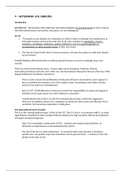9 – SETTLEMENT of IL DISPUTES
Introduction
Art 2(3) UNC: “All Members shall settle their international disputes by peaceful means in such a manner
that international peace and security, and justice, are not endangered.”
Art 33:
1. “The parties to any dispute, the continuance of which is likely to endanger the maintenance of
international peace and security, shall, first of all, seek a solution by negotiation, enquiry,
mediation, conciliation, arbitration, judicial settlement, resort to regional agencies or
arrangements, or other peaceful means of their own choice.
2. The Security Council shall, when it deems necessary, call upon the parties to settle their dispute
by such means.”
Friendly Relations affirmed this duty to settle by peaceful means so as not to endanger peace and
security.
There are several international courts – human rights courts (European, American, African),
international criminal courts (ICC, ICTY, ICTR, etc), the International Tribunal for the Law of the Sea, TWO
Dispute Settlement mechanism, and the ICJ.
There is some concern the proliferation of tribunals will lead to inconsistency, but it appears in
face to underline the relevance of IL in the modern world. Inconsistency may follow at times,
but this is not fatal to IL’s development.
Eg.ICJ vs ICTY, ECHR difference on the test of control for responsibility of a state with regard to
activities of non-state organs over which influence is exercised.
Considering the role of the ICJ as the UN’s principal judicial organ, some have suggested a
referral or consultative system for it, enabling it to advise the other courts and tribunals. This is
unrealistic, but increasing cooperation is taking place.
The International Court of Justice
The ICJ is the ‘principal judicial organ’ of the UN (Art 92). The ICJ’s role is, in accordance with IL, to settle
legal disputes submitted by states and give Advisory Opinions on legal questions referred by authorized
UN organs and special agencies.
Note: ICJ is essentially a continuation of PCIJ – virtually same statute and jurisdiction, no
distinction is made between cases decided by PCIJ and ICJ.
The role of the ICJ is to state existing law – it cannot formally create law (but in deciding a
specific case, may specify scope and sometimes note its general trend – ≠ creation). It can only
decide on the basis of law.




